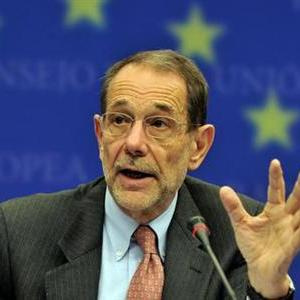What's Up Solana's Sleeve?

Iran's foreign minister, Manouchehr Mottaki, announced yesterday that Javier Solana, European Commissioner for External Relations will travel to Iran to deliver 5+1's new package of incentives.
Once again Solana has become big powers' representative and he is going to visit Tehran to deliver the 'refreshed' offers concerning its nuclear program. In his visit Solana will meet Iranian officials involved with the program.
Sean McCormack, U.S. State Department Spokesman, has also announced Solana has been slated to contact Iranian officials to set a date and venue for discussion on the proposed package. But on 20th of May after Mottaki's announcement it became known that Solana will hand the new package himself.
However, Solana's request to visit Tehran and Iran's acceptance occur while the Iranian F.M. has remarked that West's behavior towards Iran's package will affect Iran's attitude towards the incentive package. Announcing Solana's visit to Tehran to deliver the new package of sweeteners Mottaki said that: "If the 5+1 group is open to the Iranian package, it would encourage the Islamic Republic to study their package of proposals".
Although the exact date of Solana's visit to Tehran is not clear yet, based on last week announcement about the issue by U.S. Secretary of States, Solana's visit and his negotiations will happen soon.
Mohammad Ali Hosseini, Spokesman of Iran's Foreign Ministry said that: "Tehran will consider the Group 5+1 package of incentives and will announce its negotiable axes after its receipt ".
It is said that the package includes new sweeteners in return for halt of uranium enrichment.
The History of Solana's Visits to Tehran
It seems that Solana's upcoming visit will be different from the previous ones, where he had talks with Iranian officials.
During Khatami's presidency, the European Commissioner for External Relations visited Iran in several occasions to sign trade and cooperation contracts. The focus of talks at that time was Iran-EU relations. Solana took these visits despite United States hostility towards Iran.
But the next time Solana visited Iran was when he wanted to convince Iranians to sign the Additional Protocol Non-Proliferation of Nuclear Weapons. Within a few weeks, Solana returned to Iran to continue nuclear talks.
Solana's visited Tehran once again in January 2004 to create a new atmosphere in Tehran-EU relations. In this visit he remarked that Iran and the European Union are not merely financial partners and the bilateral ties must be consolidated.
While stressing that disqualification of [Reformist] nominees for the 7th parliamentary elections is an internal issue, Solana said: "it is difficult for me to explain for the European parliament how the present members of the parliament can't join the election. We demand further transparency in the election process". About Iran's nuclear activities he also said EU and Iran have been cooperating on the nuclear issues and EU welcomed Iranians' commitment.
The visits were at a time of political, economic and diplomatic reforms in Iran and both parties envisaged a promising future in bilateral ties. At the same times there were issues such as human rights conditions in Iran, U.S. concerns over Iran's activities (such as WMD production) that influenced negotiations between Solana and the Iranian officials.
With Ahmadinejhad becoming the president, Solana visited Tehran only once, to hand offers on Iran's nuclear dispute. He discussed the offers in his visit with Ali Larijani, then secretary of the Supreme National Security Council and head nuclear negotiator.
The offers had been approved during the joint meeting of foreign ministers of U.S., Britain, Russia, France, Germany and Deputy Foreign Minister of China in Vienna. These included helping Iran to use nuclear energy for peaceful programs and financial incentives in return for Iran's assuring response to global community's concerns. Meanwhile, Iran had been warned about consequences of rejecting the offer.
That's why the package was known as an inclusive package that contained both carrots and sticks and this had made Solana's missions important. In addition to proposing the offers, Solana had to negotiate with Iranians and persuade them to accept the package. Iran's negative answer meant that its nuclear course would undergo significant changes; a thing that actually happened with Iran insisting to continue its nuclear program and regarding uranium enrichment halt unacceptable.
After two years, Solana is once again going to visit Iran, this time with a package that includes new incentives and backed by Europe's resolution to continue negotiations until reaching a favorable result.
However, since halting uranium enrichment has become the essence West's offers and considered by U.S. and Europe as the only way to reach a mutually agreed upon solution, it seems that not too much hope should be put in Solana's visit and negotiation.

